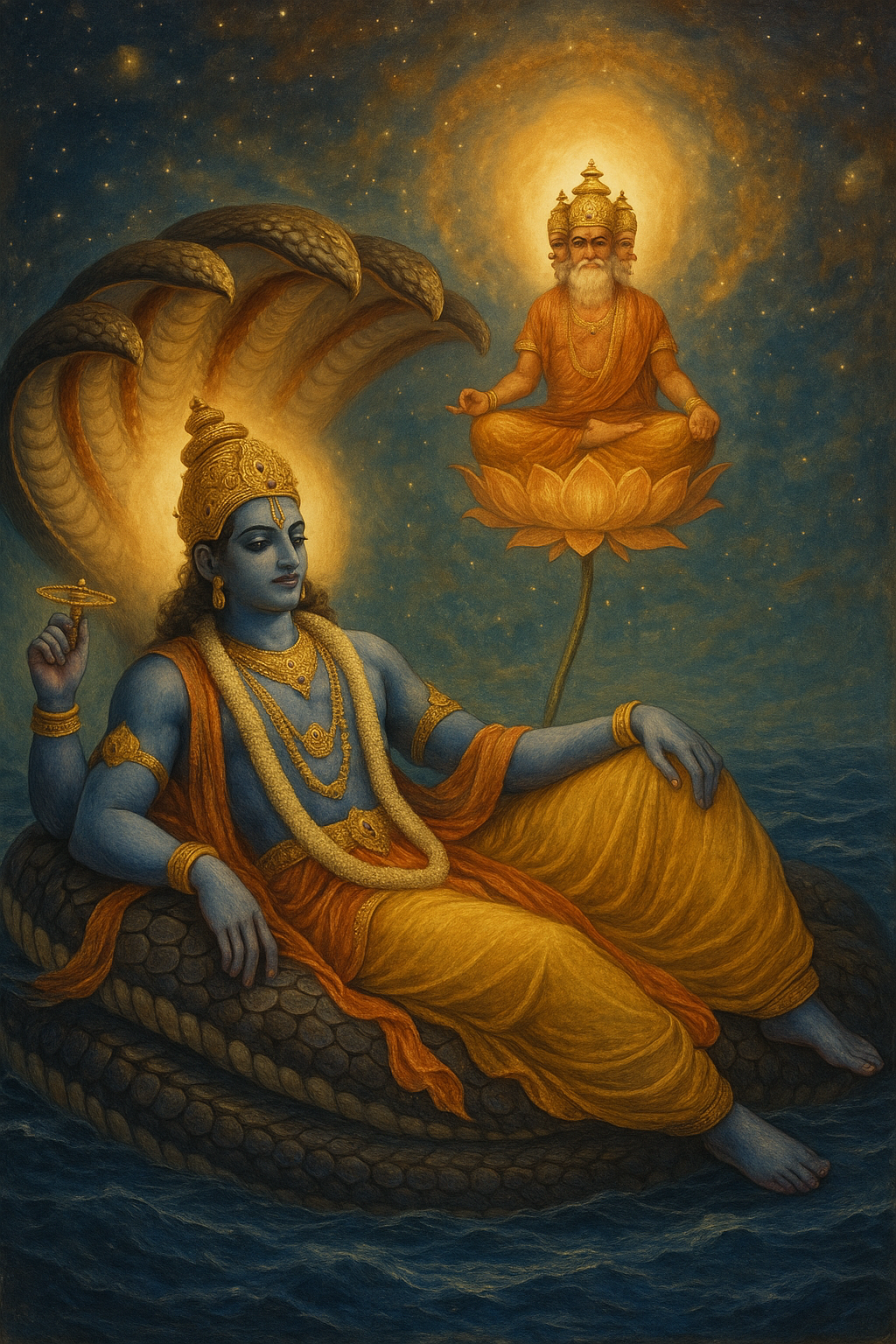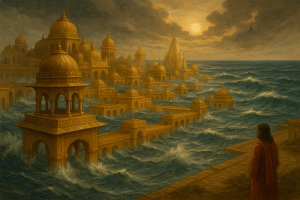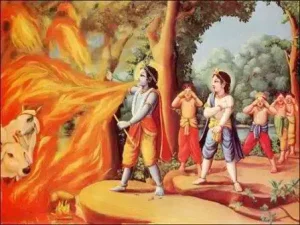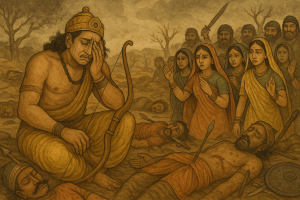The Eternal Supreme: Nārāyaṇa
In the beginning, before creation, only Nārāyaṇa, the Supreme Lord, existed. He is the eternal, all-pervading reality—the source of everything. There was no sun, no moon, no fire, no earth, and no sky. Everything was absorbed within the undivided, imperishable Supreme Brahman, whose form is transcendental and filled with eternal bliss.
That Supreme Personality of Godhead, known as Nārāyaṇa, is beyond the perception of material senses. He is beyond even the reach of the Vedas, yet He is the ultimate goal of all the Vedas. From Him, everything emanates.
The Unmanifest Prakṛti
At the time of cosmic dissolution, prakṛti (material nature) remained unmanifest, merged into its original, undifferentiated state. Time, karma, the three modes of nature, the mahat-tattva (the total material energy), and all elemental principles lay dormant within Him.
There was no creation yet—only the undivided Absolute Truth existed.
Then, by His inconceivable potency, the Lord desired to create.
The Manifestation of the Cosmic Elements
From the unmanifest, the mahat-tattva arose—the first transformation of material nature. From the mahat-tattva emerged ahaṅkāra (false ego), which produced the three subtle elements, each associated with one of the three modes:
- Sattva (goodness) gave rise to the mind and the demigods.
- Rajas (passion) generated the senses and activity.
- Tamas (ignorance) produced the tanmātras (subtle elements: sound, touch, form, taste, and smell), which then evolved into the five gross elements—earth, water, fire, air, and ether.
The Emergence of Brahmā from the Lotus
In the vast cosmic ocean, the Supreme Lord reclined upon Ananta Śeṣa, the thousand-hooded serpent of eternity. From His navel blossomed a golden lotus, and from that lotus appeared Brahmā, the four-headed first living being.
Looking in all directions, Brahmā could see only water. Not knowing his origin, he became perplexed. After performing tapas (austerities) for thousands of celestial years, he received divine revelation from within:
“All this is born from Nārāyaṇa. From Him alone I have appeared. Let me now create the world under His guidance.”
Brahmā’s Creation Begins
Empowered by Lord Nārāyaṇa, Brahmā began the task of creation. He manifested the Prajāpatis, the progenitors of mankind, and organized the births of sages, demigods, animals, and other beings.
He divided the universe into fourteen planetary systems, with Bhū-loka (Earth) as the central realm where karma is enacted and elevation is possible.
Appearance of Dharma and Adharma
Within creation, the principles of Dharma (righteousness) and Adharma (unrighteousness) also took form.
- Dharma appeared as a radiant bull with four legs, symbolizing the four pillars of religion: truthfulness, compassion, cleanliness, and austerity.
- Adharma, in contrast, appeared as a figure of falsehood and duplicity, always seeking to corrupt the minds of living beings.
To protect Dharma from decline, the Lord Himself vowed:
“Whenever Dharma is weakened and Adharma rises, I shall descend in My divine form to restore balance.”
The Purpose of Creation
The Lord did not create the universe for any selfish reason. His divine creation is meant to offer conditioned souls the opportunity to evolve spiritually, purify themselves, and return to Him through the path of bhakti (devotion).
In this grand cosmic play, every being—whether a deva, asura, sage, or ordinary soul—is given a chance to reconnect with the eternal Supreme Lord.
The Eternal Controller
Although He creates, Lord Nārāyaṇa remains untouched by His creation. Just as the sun reflects in many waters yet remains distant, so too the Lord pervades everything but remains ever transcendental.
The creation, maintenance, and dissolution of the universe all occur through His energies, and by His will, time itself begins and ends.
Lessons to Be Learned:
- The Supreme Lord Viṣṇu or Nārāyaṇa is the cause of all causes. He is unborn, eternal, and the ultimate source of everything.
- Creation is not random; it is a divine arrangement designed for the upliftment of souls.
- The Lord acts through empowered beings like Brahmā, who create under His guidance.
- True knowledge begins with humility, as shown by Brahmā’s austerities and surrender.
- The goal of life is not material enjoyment, but liberation through loving devotion (bhak



